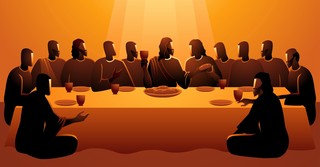What Makes an Apostle?
Share

It is common for countries to send ambassadors as representatives to other nations. The ambassador’s role is ensuring that his country is well represented, and occasionally for the purpose of making treaties. His authority is granted by the leader of his home country. The leader is the authority who bestows certain powers to his emissaries, but not usurping his own power.
In the same sense, the Apostles Jesus designated represented Him, but the ultimate authority was and is His.
Photo credit: ©Getty Images/Andrii Zorii
What Is an Apostle and Where Do We See Them in Scripture?

Two distinct definitions exist for apostle based on how the word is used within Scripture.
It is used only in the New Testament, beginning in the Gospels, and the translation comes from the Greek word apostolos. In its literal sense, it means “one sent forth.” The exact nature of its role, however, rests in the one who sends. This is an important distinction when reading the biblical text.
The Bible uses the word Apostolos of Jesus when it describes His relationship to the Father (John 17:3; Hebrews 3:1).
Jesus chose twelve of His disciples for special one-on-one training, and they became His special ones, called Apostles (Luke 6:13, 9:10). The book of Acts gives us the biblical account of their proclamation of the Gospel and their actions after Jesus ascended.
The Apostle Paul was also called by Jesus, but not in the same way as the others. He saw the Lord Jesus (Acts 9:1-19) and Jesus commissioned Him, “as a chosen instrument of Mine to carry My name before the Gentiles and kings and the children of Israel” (Acts 9:15).
The Apostle Peter defined the necessary qualifications one must possess to be an Apostle of Jesus: chosen by Jesus, accompanying Jesus throughout His earthly ministry which began at His baptism by John the Baptist and as eyewitnesses to His resurrection. According to these, Paul did not wholly qualify, but he was directly commissioned by the Lord Jesus to carry the Gospel to the Gentiles (1 Corinthians 9:1; 1 Corinthians 15:8-10). We can refer to the twelve with a capital A, as they were all called and sent directly by the Lord Jesus.
Small-a apostles were also sent, but not directly by Jesus; their authority was derived by those who were given authority by Jesus. And although Paul was included within the grouping of apostles in Acts 14:4, 14 – since it included those who were not called in person by Jesus (e.g., Barnabas) – small-a apostles is the correct rendering. Romans 16:7 speaks of Andronicus and Junia as apostles, but they were ministry workers alongside Paul, consigned to their posts in service to the Apostle Paul and to Christ.
2 Corinthians 8:23 mentions two unnamed brothers as apostles (messengers) of the churches, and they, as well as Titus are considered small-a apostles. Important for the work of the kingdom, but not specifically called to their station by Jesus.
Paul, in Philippians 2:25, calls Epaphroditus “my brother and fellow worker and fellow soldier, and your messenger (apostolos) and minister to my need,” (Paul’s need). Later, in 1 Thessalonians 2:6 Paul defended his role and that of those he had called to serve with him in ministry. He said, “Nor did we seek glory from people, whether from you or from others, though we could have made demands as apostles of Christ.” Here he speaks of himself, Timothy, and Silas as he explains their relationship to Christ through him as an Apostle.
Photo credit: ©Getty Images/Grace Cary
Who Were the Apostles in the Bible?

Luke 6:14-16 gives us the identities of the Apostles Jesus called: Simon (Peter), Andrew (Peter’s brother), James and John, Philip, Bartholomew, Matthew, Thomas, James son of Alphaeus, Simon the Zealot, Judas, the son of James, and Judas Iscariot (the future traitor). After Jesus’ ascension (Acts 1:2, 9), the remaining eleven Apostles (Judas Iscariot was dead by then) gathered in the same upper room where Jesus had shared His last supper (Mark 14:14-21).
Peter stood before the crowd of disciples and declared Scripture had to be fulfilled in the death of Judas Iscariot (Acts 1:20). Peter said, “beginning from the baptism of John until the day when He was taken up from us — one of these men must become with us a witness to his resurrection. And they put forward two, Joseph called Barsabbas, who was also called Justus, and Matthias” (Acts 1:22-23). By casting lots, Matthias was chosen to replace Judas as the twelfth Apostle (Acts 1:26).
What Is a False Apostle?
Paul in 2 Corinthians 11:13 issues a warning about false apostles, “For such men are false apostles, deceitful workmen, disguising themselves as apostles of Christ.” What did he mean?
Looking at the passage’s context, we see the Corinthian church had been influenced by these false apostles who proclaimed a different Jesus than they, received a different spirit (a lying one for sure) than they, and proclaimed a false Gospel.
Paul also denounced the so-called “super apostles” (v. 5) whose aim was self-aggrandizement and not the truth. Pastor John Piper says, “So-called ‘super-apostles’ had found their way to Corinth. These parasitic charlatans had followed in the wake of the Lord’s servant and were siphoning off glory from God and discrediting Paul in order to inflate the appearance of their self-importance.” The truth of Christ was in Paul. He likened the false apostles to Satan and his minions, for Satan is able to “disguise himself as an angel of light” (v. 14).
For us today, we must be diligent students of the Word, and our fellowship should consist mostly of mature believers. The church is of Jesus, and for His glory. Yes, be in the world, too, but not of it (John 17:14-18; 1 John 2:15).
Photo credit: ©Getty Images/rudall30
Are Apostles Active Today?

Used in the sense of a messenger, another can be a small-a apostle. As we saw in the instances recorded in the Bible, Barnabas, Silas, Timothy, and some others were referred to as apostles sent by the Apostles who had been in the presence of Jesus and sent by Him. To obey them was to obey Christ.
The only Apostles given direct authority by the Lord Jesus are those He chose in Luke 6:14-16 and Acts 9:1-19. As such, only they had the powers given by Jesus to proclaim Him as Lord. Part of the powers they were given (healing, miracles) were signs to unbelievers to make Jesus known as Lord and to authenticate them as His Apostles as His church went through its foundational season.
Little-a apostles as messengers may be active today, but only as biblical truth-tellers and Christ’s servants. Nowhere does the Bible say the role of Apostle would continue. Jesus said their teaching and proclamation, however, would continue. In John 17:18-21, Jesus spoke to His Father of the Apostles “As You sent me into the world, so I have sent them into the world. And for their sake I consecrate Myself, that they also may be sanctified in truth. I do not ask for these only, but also for those who will believe in Me through their word, that they may all be one, just as You, Father, are in Me, and I in You, that they also may be in Us, so that the world may believe that You have sent Me.”
If a person or denomination states they have renewed the office of Apostle (as commissioned by Christ), they are false apostles. The power and authority of the Apostles ceased at their deaths. More information is also available on current movements that claim Apostles and prophets are still in operation. Don Stewart offers another balanced view regarding this issue.
The Bible we hold in our hands — God’s Word — is the testimony of all the people God used to pen its text, including the Apostles. That’s a miracle!
Photo credit: ©Getty Images/Klaus Vedfelt
